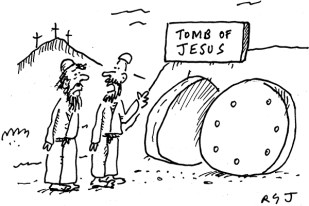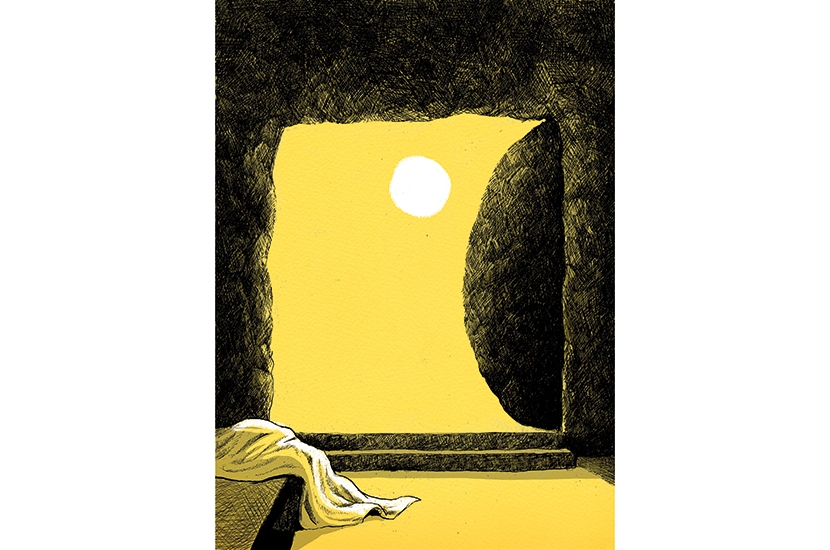I was raised Christian and the more I’ve thought about it, the more curious something about my upbringing seems. My church was constantly denying it was ‘religious’. By any objective social–scientific measures, the community was decidedly religious. Maybe we weren’t that organised (there was no website), but we recited historic creeds, we submitted to the authority of a sacred text and we practised ancient rituals. We identified with the worldwide institutional expression of the body of Christ, yet we still liked to say we weren’t ‘religious’. Throughout my childhood I was reminded in sermon after sermon that we were ‘-Spiritual but not Religious’.
One reason for this was a sincere desire to avoid religiosity: going through the motions when your heart’s not in it. But another reason, I think, was marketability. We knew that the pews were emptying, and we knew that as the practice of religion waned, talk of spirituality flourished. Business schools were increasingly stressing the importance of ‘spiritual capital’ to entrepreneurship and headteachers were insisting spirituality was ‘a basic premise of a holistic education’. By identifying ourselves as Spiritual but not Religious we hoped we could be a home for anyone nervous of ‘religion’.
Looking back, I think we paid too high a price. Spiritual but not Religious was a mistake. Why? Because by opting for it my church smudged out faith’s real attraction. It missed the opportunity to hold out something radically counter-cultural — a much-needed alternative to spiritual consumerism.

Self-identifying as ‘Spiritual but not Religious’ took off with the advent of online dating in the early 2000s, but its roots reach back half a century further. As early as 1940, Bill Wilson, founder of Alcoholics Anonymous, referred to his programme as ‘Not Religious, but Spiritual’. Wilson was inspired by the 19th-century philosopher and psychologist William James to forge a model of spirituality which was personal, pragmatic and progressive. The message was clear: no hierarchies, dogma or rituals here. Just an intense, personal connection with a higher power.
The problem with talk of ‘-spirituality’ without religion is that it trades on a disastrously Romantic idea of religious experience. The 18th-century German theo-logian Friedrich Schleiermacher insisted that authentic religious experience was about intense feelings of dependence on a higher power. What that does is make a peak experience into the paradigm-case. It raises your expectation that a dramatic conversion be an everyday event, that each day be Damascene. But what happens if those feelings are absent? What happens if you go into your room and shut the door and you don’t collapse, tremble, prophesy or speak in tongues?
Talk of ‘spirituality’ without religion trades on a disastrously Romantic idea of religious experience
The Spiritual but not Religious pride themselves on being seekers, not dwellers. But in so atomised a world, it’s really dwelling that we crave. There is a beautiful banality about belonging to a particular community. Nothing could be less sexy than the Bible study I ran with my wife Holly for our local Anglican church. But because the people who came were committed to it — turning up week after week — what started out as an awkward and disparate group of strangers of all different ages and from different backgrounds morphed over time into a diverse community where people slowly started to feel they belonged.
What happened there was not dramatic, but it was profound. Isolated people found a place in the world. People who weren’t well came for prayer, consolation and support.
In the most in-depth study of the Spiritual but not Religious, Belief Without Borders, the religious scholar Linda A. Mercadante acknowledges she met few people ‘who had made ongoing commitments to activist groups or issues that required long-term organisation in order to create change’.
Belonging to a religious community, by contrast, brings with it commitment to causes. So despite significant loss of income over the past year, almost half of churches recently surveyed by the Evangelical Alliance have started to deliver new services in light of the crisis — in particular befriending the elderly and offering emergency food provision. ‘I am deeply proud of belonging to that institution,’ the Archbishop of Canterbury Justin Welby told me. ‘Churches at the local level have shown during lockdown that they love their communities and love God.’
There’s an annoying mantra from the SBNR types that I heard ad nauseam growing up: ‘Faith isn’t about rules but relationship.’ The problem here isn’t what is being affirmed; it’s what’s being denied. To say faith is about relationship not rules makes rules sound simply restrictive. But this isn’t the way rules work in the Abrahamic faiths. God’s laws are the ways of life, grooves marked out for us to make our way through often perilous ground. Rules are not imperatives imposed upon us from without. Rather, they answer to our innate orientation to goodness.
A church which parades as Spiritual but not Religious ignores the offer of transformation. ‘The problem with the consumerist mentality is that it sticks with the desires you’ve got,’ Rowan Williams tells me. So the danger is you miss the possibility of being changed by what you find. ‘The church can go along with the market mentality and make people feel it’s meeting their needs. Or it can say, “Something utterly extraordinary has taken hold of us. Come and see”.’
Ultimately, transformation is what Easter is about: a man bodily raised from the dead and returning in his new body — neither corpse nor ghost — to have breakfast with his friends. This ‘life after life after death’, as it has been termed, was a completely novel idea which became the basis of a hope that changed everything.






Comments